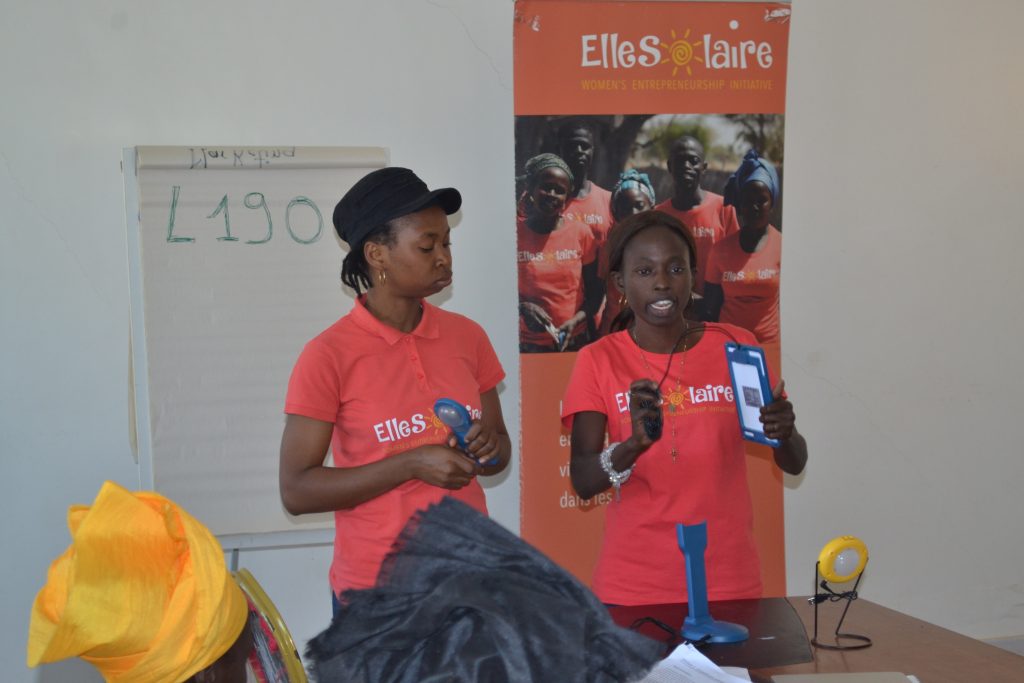International Girls in ICT Day 2025 is celebrated on 24 April to encourage girls and women to pursue careers in Information and Communication Technology (ICT). This year’s theme is “Girls in ICT for inclusive digital transformation,” emphasizing the importance of gender equality in the digital world. To mark this day, the Internet Society Foundation highlights three grant partners’ projects that are making a difference in connecting, training, and empowering girls around the world using technology and the Internet to shape a more inclusive future.
ElleSolaire provides energy and Internet access to rural villages in Senegal
Rural Smart Kiosk is the project that ElleSolaire is implementing in rural villages in Senegal. It deploys kiosks equipped with solar panels and batteries in public places, providing energy, access to the Internet, and thematic training to support the populations in creating viable income-generating activities. This project is funded by the Internet Society Foundation BOLT Grant Program – Building Opportunities/Leveraging Technologies (BOLT) and implemented by ElleSolaire, the first women-inspired and women-led solar social enterprise in West Africa.
ElleSolaire supports women entrepreneurs by creating income-generating activities after training sessions and building an entrepreneurship network using renewable energy in remote off-grid communities in West Africa. With the Rural Smart Kiosks placed in schools, health centers, village squares, or women’s association headquarters of the villages, ElleSolaire can provide Internet connectivity and conduct training on digital marketing, e-commerce, and e-learning programs, helping women with local entrepreneurship activities.
The southern Senegal rural communities don’t have reliable access to electricity or the Internet, which impacts women by preventing them from converting their entrepreneurship activities to digital tools and e-commerce, even though they are producing a great amount of goods needed in urban areas. Additionally, youth lack access to digital technology training, and girls are not enrolled in schools because of security issues and the distance from training centers.
The Rural Smart Kiosks in 30 remote villages will provide jobs and training for more than 1,000 young girls and women. They also will allow villages to have access to health digital services for birth declarations, make it easier for local nurses to receive diagnoses directly, and send information to hospitals in the nearest cities. Local authorities will have the opportunity to communicate better with the population and share training and employment opportunities with them, and the products from the area can be ordered remotely to avoid the loss of harvests.

Overcoming social vulnerability with inclusion and digital skills in Brazil
“Connected Girls: Digital Skills for Productive Inclusion” is a project implemented by TechSoup Global and the Institute Lojas Renner in the Brazilian state of Rio Grande do Sul. It benefits more than 200 young women between 15 and 17 years old who are in a situation of social vulnerability, worsened by the public calamity that the Rio Grande do Sul region has experienced due to extreme weather events.
The main goal of this project is to promote digital inclusion based on an educational plan for these students at public schools, whose social vulnerability has worsened due to the flooding in the region, especially in the cities of Porto Alegre (capital of the State of Rio Grande do Sul), Cachoeirinha, Novo Hamburgo, Taquara, Canoas, and Rio Grande. Soft and hard skills are taught and developed during the four months of training, focusing on career and community, allowing technological knowledge on the Internet and developing the girls’ ability to network, therefore contributing to their insertion into the job market, in a region impacted by a high female unemployment rate.
This project is funded by our grant program SCILLS (Strengthening Communities/Improving Lives and Livelihoods), and implemented by TechSoup Global and Institute Lojas Renner, whose focus is empowering women and communities through projects promoting productive inclusion and community strengthening. Gender inequality in the Brazilian job market is high in all Brazilian regions, including the State of Rio Grande do Sul, and even higher for young people living in urban outskirts. The project’s choice to prioritize young women is intended to contribute to insertion and productive inclusion based on technological knowledge, especially on the Internet.
Bridging the Digital Gender Gap in Liberia
The Internet Society Liberia Chapter organized a workshop on “Gender Equality: Bridging the Digital Gender Gap, Increasing Women’s Participation.” The hybrid workshop took place in 2023, bringing together female participants from various high schools, universities, government, SME businesses, journalists, civil society, and non-profits to discuss the most important issues females face in the digital world.
The capacity-building workshop allowed the 130 female participants to address the digital gender gap, gender inequality, and increase women’s participation in the digital public sphere, identifying major challenges affecting the digital inequality and increasing the gap in Liberia, such as limited financial funding, lack of opportunities, safe digital space, and high cost of data and electronic devices.
The workshop’s hands-on activities enhanced the learning experience. Highly qualified female facilitators from local and international backgrounds served as mentors to the young women participants, providing awareness, coaching, and encouraging strategies and policy development to bridge the digital gap and the importance of women’s digital rights.
The digital divide in Liberia affects more the women when compared with men further their education and gain access to training. The women participants pointed out that these challenges can be addressed by creating more tech educational facilities, scholarships, and capacity-building training for women, such as this workshop.
This capacity-building workshop was funded by the Internet Society and the Internet Society Foundation and implemented by the Internet Society Liberia Chapter, in partnership with the Liberia Ministry of Post and Telecommunications (MOPT), the Liberia Telecommunication Authority (LTA), and the Liberia Information Technology Student Union (LITSU).
